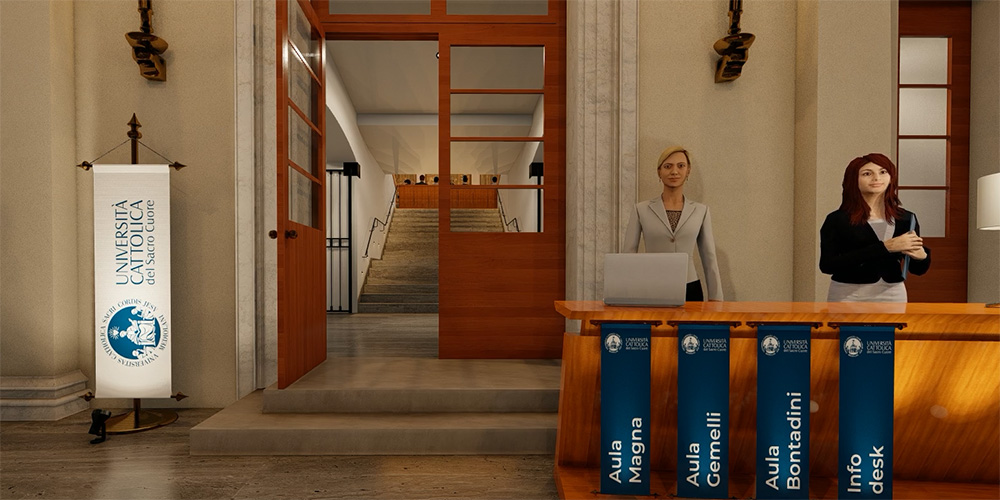The Faculty of Education participates with its own teaching, organizational and research resources, together with the Faculty of Arts and Philosophy, in the activation of this graduate degree programme.
Objectives
The graduate programme in Philosophy (LM-78) has the following distinctive educational objectives, encompassing specific knowledge, skills, and competencies:
- Graduates will be guided both towards the acquisition of an in-depth knowledge of the historical evolution of philosophical thought, and the theoretical deepening of specific ethical, anthropological and bioethical, epistemological and metaphysical problems. Students' training will take place within differentiated teaching curricula and must conclude with specific research of a distinctly scientific nature;
- Graduates will be able to communicate fluently, both in written and spoken form, not only in Italian but also in English (compulsory), as well as in either French or German (optional), with particular attention to discipline-specific vocabulary;
- Graduates will also possess the computer and telematic skills that today make scientific research easier, even in the field of humanities;
- Graduates will be able to benefit from an organic philosophical training to access the subsequent levels of training for the achievement of the qualification for secondary teaching or professional areas of communication and training and management of human resources.
Programme Structure
The programme focuses on three fundamental areas of research and training. These areas, based on the revival of the classical and metaphysical tradition and its critical actualization in the contemporary world, are the ethical-bioethical-anthropological field, the historical-philosophical field, and the theoretical-logical-epistemological field.
Historical-philosophical field
In the historical-philosophical field, the programme aims to provide students with the in-depth methodological and theoretical tools of philosophical studies, and to provide them with an adequate knowledge of the historical evolution of philosophical thought. The essential and foundational issues of philosophy will be addressed through a careful and critical study of the authors of the Western metaphysical tradition and of the contemporary philosophical debate. Therefore, the reference to the texts will be considered essential and must be conducted with philological and critical awareness.
Ethical-bioethical-anthropological field
In the ethical-bioethical-anthropological field, the programme aims to deepen the knowledge of practical philosophy, ethics and bioethics with attention also to the relationship with human sciences. Teaching in this area focuses primarily on the speculative structure of the practical and most relevant problems, in particular those concerning the human person in the scientific, cultural and social context of the contemporary era. The curriculum is designed primarily to develop appropriately critical skills in the history and theory of practical and ethical knowledge, also in order to address the anthropological problems posed by bioethics in relation to contemporary scientific and medical instances. Furthermore, it will provide the conceptual tools necessary to analyze fundamental ethical-political themes.
Theoretical-logical-epistemological field
In the theoretical-logical-epistemological field, the programme aims to equip students with conceptual and methodological tools useful for the development of critical and in-depth skills in the fields of theoretical philosophy, logic, philosophy of sciences (formal, natural and human), ontology and its metaphysical implications. Particular emphasis is placed on deepening theoretical reflection starting from the classical metaphysical tradition (ancient, medieval, modern), up to the contemporary expressions of the philosophy of existence and the most recent analytic ontology.
General Profile
The general profile offers students the opportunity to build a highly personalised study plan, drawing on a wide range of teachings in the various subject areas of the programme. This flexibility allows students to explore different areas of philosophy and other related disciplines without being tied to a specific predefined path. Students can thus develop a diversified and cross-sectoral philosophical education, choosing from courses in bioethics, ethics, philosophy of mind, political philosophy, philosophy of science, logic, ontology and metaphysics, history of philosophy, and many other disciplines. The programme also makes it possible to integrate philosophical training with teachings from classical, historical, anthropological, political, social, legal, literary and artistic disciplines, offering a complete and in-depth overview that embraces various dimensions of human knowledge. Students can thus acquire critical and methodological skills, developing an articulated and multidisciplinary vision of contemporary reality.
Ask our students
UnicattX




